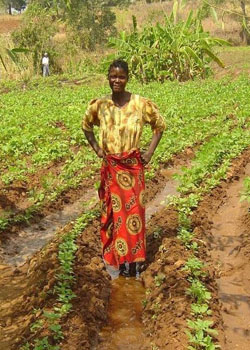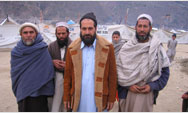You are here » Home » Telling Our Story
Success Story
Woman shows how gravity-fed irrigation can produce bumper crops
From Poor to Pioneering

Photo: Cristina Hanson/I-Life
Emily Baziwell, amid her maize, tomato, and bean crops, helped familiarize her village to
irrigation, a method that has since successfully spread to other farms.
“Unlike in the past, this year I expect to have a bumper production because I have applied recommended farm-ing methods,” said Malawian farmer Emily Baziwell
In August 2003, Emily Baziwell returned to Mkolimbo, her mother’s village in Ntcheu District, to look after not only her four children, but also her widowed mother and three younger siblings. Her only asset was the knowledge of irrigation that she acquired from her estranged husband.
She started farming on a small 10-by-25 meter (approximately 11-by-27 yard) plot using a treadle pump that one of her neighbors would occasionally lend her. She managed to harvest one 50 kilogram (110 pound) bag of shelled maize and a little less than one bag of beans in the first year, but this was not enough to feed two adults and seven children. “I was hungry and hopeless considering the size of my family,” said Emily.
During the 2006 dry season, a staff member from a USAID-funded program noticed her bright green irrigated plot amid the dry surroundings. When the implementing partner later met with Emily’s neighbors, it was clear that the villagers had overcome their initial skepticism about this method of farming and wanted to know more.
Through the USAID-support program, Emily and other Mkolimbo village members learned about gravity-fed irrigation based on river diversion and established an 8 hectare (39 acre) site. In 2007, 40 farmers grew a variety of crops, including maize, tomatoes, beans, potatoes, sweet potatoes, and different green leaf vegetables.
Emily cultivated almost half an hectare (1.2 acres) of maize, tomatoes, and sugar beans, an area almost 16 times the size she managed to irrigate on her own. “Unlike in the past, this year, I expect to have a bumper production because I have applied recommended farming methods,” Emily said halfway through the season, adding that the coming of the implementing partners had reduced hunger in the entire Mkolimbo community.
By season’s end, she had harvested enough to feed her family for a year and even managed to sell her surplus produce for $177, a remarkable sum in a country where the average annual income is $170.
Print-friendly version of this page (533kb - PDF)
Click here for high-res photo
Back to Top ^ | 

